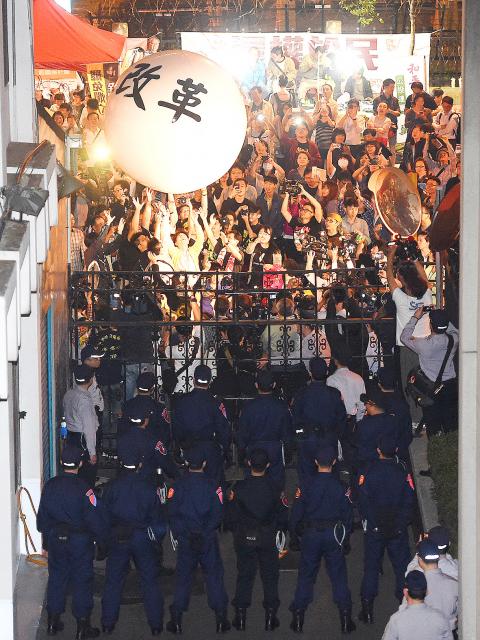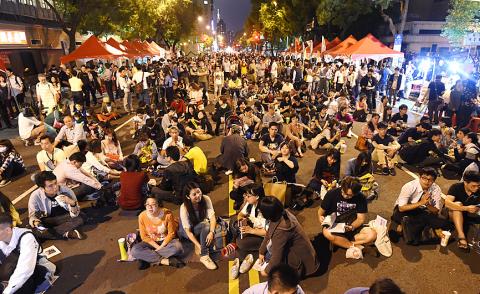Multiple rallies were held across Taipei yesterday as the nation commemorated the first anniversary of the Sunflower movement, marking the day when student-led protesters first began to lay siege to the Legislative Yuan in the capital over the government’s handling of a proposed cross-strait service trade agreement.
The participants revisited demands made during last year’s landmark protests, in which activist groups occupied the Legislative Yuan’s main chamber for almost 23 days, while tens of thousands of demonstrators were encamped outside the legislative compound.
While centered on continued concern about relations with China, the protesters also expressed diverse demands for political reform, spearheaded by youth activist groups that blossomed in the aftermath of the Sunflower movement.

Photo: Liao Chen-huei, Taipei Times
At the largest rally, more than 1,000 demonstrators returned to Jinan Road next to the legislative compound last night to show their support for the activist groups.
The event featured speeches by prominent social activists, as well as more than a dozen stands promoting the ideas of various social movements, ranging from groups calling for reform of the Constitution to petition drives aimed at amending the Referendum Act (公民投票法).
As the activists commemorated the Sunflower movement, Mainland Affairs Council Minister Andrew Hsia (夏立言) hosted a live public hearing online, in a bid to promote the Chinese Nationalist Party’s (KMT) proposed version of a cross-strait oversight bill.

Photo: Liao Chen-huei, Taipei Times
The passage of a cross-strait oversight bill was the primary demand of the Sunflower movement, after Chinese Nationalist Party (KMT) Legislator Chang Ching-chung (張慶忠) sparked a public outcry when he attempted to ram through a preliminary reading of the service trade pact in about 30 seconds.
Human rights lawyer Lai Chung-chiang (賴中強), one of the most vocal critics of President Ma Ying-jeou’s (馬英九) administration, said that the government’s version of the cross-strait oversight bill is “designed to prevent any meaningful oversight.”
He urged the public to visit a Web site launched by activist groups, where netizens would be able to express their views on eight proposed versions of the oversight bill through a series of detailed questionnaires.

Photo: Chu Pei-hsiung, Taipei Times
At one point during the demonstration, protesters pushed a large balloon over the walls of the legislative compound with the words “constitutional reform” etched across it.
Members of the Civic Alliance to Promote Constitutional Reform urged comprehensive reforms to the Constitution, saying that the Sunflower movement illustrated serious flaws in the nation’s political institutions.
The rally drew a diverse crowd, with protesters sitting on the ground to participate in the event.
One protester, a man in his 20s surnamed Yang (楊) who works in the restaurant industry, said that the movement was important because it disrupted the pace at which the government was carrying out negotiations with China.
He said the movement created an impact among the younger generation, as more people are now willing to show their support for social movements and underprivileged groups.
Another supporter, surnamed Hsiao (蕭), showed up at the rally with his three-year-old daughter.
He said the movement encouraged him to participate in politics by getting involved in a ballot-watching campaign during the nine-in-one elections last year.
At a separate rally earlier in the day, student activist Chen Wei-ting (陳為廷), who played a leading role in the Sunflower movement along with fellow activist Lin Fei-fan (林飛帆), said that the Ma administration has continued to promote closer ties with China.
“We all know that the Ma administration does not just want to implement the cross-strait service trade agreement or continue economic negotiations; what follows is a push for a meeting between Ma and [Chinese President] Xi Jinping (習近平), as well as political negotiations,” Chen said.
Looking back on last year’s protests, Chen said that the decisionmaking process throughout the movement lacked democratic participation among its members, adding that the “deification” and increased public attention on the leaders of the movement should be re-examined.
Chen has disappeared from the public eye since December last year, after a series of sexual harassment scandals surfaced, marking an abrupt end to his 17-day legislative campaign in the Miaoli by-election.
The embattled activist participated in a smaller rally earlier in the day led by former Democratic Progressive Party chairman Lin I-hsiung (林義雄), in which about 200 members of the People Rule Foundation marched around the Legislative Yuan.
Wearing their signature bamboo hats, the protesters made seven laps of the Legislative Yuan compound in silence, in reference to the biblical Battle of Jericho, in which the walls of Jericho were said to have crumbled after the Israelite army marched seven times around the city.
Academia Sinica researcher Huang Kuo-chang (黃國昌) said campaigns led by youth activist group Taiwan March, which grew out of the Sunflower movement, aimed to tackle problems inherent in the nation’s political institutions — such as the failure of legislators to respect public opinion.
He urged the public to continue to support activists’ drive to reform the Referendum Act to ensure that the public have a say in political decisions.

SECURITY: As China is ‘reshaping’ Hong Kong’s population, Taiwan must raise the eligibility threshold for applications from Hong Kongers, Chiu Chui-cheng said When Hong Kong and Macau citizens apply for residency in Taiwan, it would be under a new category that includes a “national security observation period,” Mainland Affairs Council (MAC) Minister Chiu Chui-cheng (邱垂正) said yesterday. President William Lai (賴清德) on March 13 announced 17 strategies to counter China’s aggression toward Taiwan, including incorporating national security considerations into the review process for residency applications from Hong Kong and Macau citizens. The situation in Hong Kong is constantly changing, Chiu said to media yesterday on the sidelines of the Taipei Technology Run hosted by the Taipei Neihu Technology Park Development Association. With

CARROT AND STICK: While unrelenting in its military threats, China attracted nearly 40,000 Taiwanese to over 400 business events last year Nearly 40,000 Taiwanese last year joined industry events in China, such as conferences and trade fairs, supported by the Chinese government, a study showed yesterday, as Beijing ramps up a charm offensive toward Taipei alongside military pressure. China has long taken a carrot-and-stick approach to Taiwan, threatening it with the prospect of military action while reaching out to those it believes are amenable to Beijing’s point of view. Taiwanese security officials are wary of what they see as Beijing’s influence campaigns to sway public opinion after Taipei and Beijing gradually resumed travel links halted by the COVID-19 pandemic, but the scale of

A US Marine Corps regiment equipped with Naval Strike Missiles (NSM) is set to participate in the upcoming Balikatan 25 exercise in the Luzon Strait, marking the system’s first-ever deployment in the Philippines. US and Philippine officials have separately confirmed that the Navy Marine Expeditionary Ship Interdiction System (NMESIS) — the mobile launch platform for the Naval Strike Missile — would take part in the joint exercise. The missiles are being deployed to “a strategic first island chain chokepoint” in the waters between Taiwan proper and the Philippines, US-based Naval News reported. “The Luzon Strait and Bashi Channel represent a critical access

Pope Francis is be laid to rest on Saturday after lying in state for three days in St Peter’s Basilica, where the faithful are expected to flock to pay their respects to history’s first Latin American pontiff. The cardinals met yesterday in the Vatican’s synod hall to chart the next steps before a conclave begins to choose Francis’ successor, as condolences poured in from around the world. According to current norms, the conclave must begin between May 5 and 10. The cardinals set the funeral for Saturday at 10am in St Peter’s Square, to be celebrated by the dean of the College